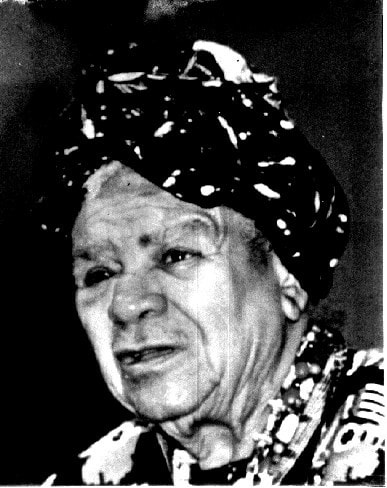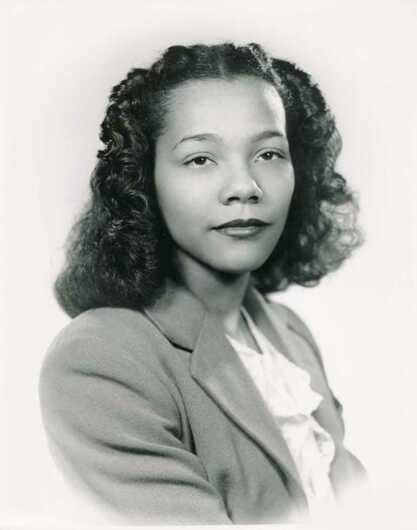|
Audley Moore was the daughter of parents Ella and St. Cry Moore who were the children of former slaves. Moore’s Grandmother Nora Henry was born into slavery and was the product of her mother being raped by her enslaver. Moore’s grandfather was lynched leaving her grandmother to raise five children on her own. Audley Moore was born on July 27th, 1898 in New Iberia, Louisiana, where both of her parents would die before she graduated the fourth grade. She would become her family’s primary caretaker; she learned how to become a hairdresser by the age of fifteen to bring home money. By 1918 she was working as a volunteer nurse in mist of an influenza outbreak; during World War I she and her sisters worked in Anniston, Alabama to help create what she called the “Black USO,” it was created to help provide medical care and services for black soldiers. During the early 1920’s while traveling the country she learned that racism was engrained into the culture of the United Sates, it was not just the culture of the southern states. After returning to Louisiana she would experience a life changing moment, she was able to hear the Honorable Marcus Mosiah Garvey speak about black unity and collective black empowerment. Hearing the words of Garvey would lead to her becoming a member and eventually a leader of the United Negro Improvement Association (UNIA). Moore along with her husband and her sisters would move to Harlem, New York during the early 1920’s, this was around the time she became active in the civil rights movement. Despite being arrested multiple times, she organized and fought for domestic workers in the Bronx and helped black tenants fight against white slum lords. In 1931 she participated in a march to Harlem along with the Communist party to advocate for justice for the Scottsboro Boys. She would later become a member of the Communist Party as well as a member of the International Labor Defense. As a member of the Communist Party Moore became the party’s representative for the New York State assembly in 1938 and Alderman in 1940. Queen Mother Moore was determined to make a difference for her people, so she became a member of the National Association for Colored women and the National Council of Negro Women. But by the 1950’s she ended her relationship with the Communist Party because it no longer supported self-determination for African-Americans. Her next step was to become a cofounder the Universal Association of Ethiopian Women, which was an anti-lynching group that also fought for the rights of African-Americans on welfare and in prison. In 1957 Moore would present a petition supporting reparations, land and self-determination against genocide, to the United Nations. She would also present a second petition to the UN in 1959. In her petition she asked for a monetary sum of $200 Billion and a returning of any African people who wanted to return to the African continent. In 1963 she would form the Reparations Committee of Descendants of U.S. Slaves to further her demands for reparations. She would publish her analysis of reparations titled Why Reparations? Reparations Is the Battle Cry for the Economic and Social Freedom of More than 25 Million Descendants of American Slaves. Moore created a detailed analysis of why African people deserve reparations and how reparations can be paid out to the descendants of enslaved Africans. Moore was able to point to times in recent history where disenfranchised people have been paid reparations for their oppression. She was even able to provide information proving that the United States recently paid reparations to Japanese Americans for the oppression they suffered at the hands of America. Queen Mother Moore became well known for her international fight for reparations for African people. She was also known for her saying; “Reparations. Reparations. Keep on. Keep on. We’ve got to win.” Moore was able to mobilize enough people to gain over 1 Million signatures and present them to President Kennedy on the 100th anniversary of the signing of the Emancipation Proclamation. During the 1960’s Moore was instrumental in the creation of the Republic of New Africa’s Independent Charter as one of the first signers of the documents. This charter would help create five independent African states which would also help in the process of creating independent African nations. She would travel extensively throughout the African continent during the late 1960’s and the 1970’s. She was often invited to these nations by their leaders because they revered her work. During an Ashanti naming ceremony in Ghana Audley Moore officially became “Queen Mother” Audley Moore. Her first act as Queen Mother was to help found the Eloise Moore College of African Studies, Vocational, and Industrial School in Parksville, New York. Queen Mother Moore would die in May of 1997, but before her death she was present for Nelson Mandela’s visit to the U.S. in 1990, and was one of the five female speakers at the Million Man March in 1995. She was a woman on a mission to free her people and didn’t allow anything to stop her. She spent the remainder of her adult life fighting for reparations and the rights of African people. Queen Mother Audley Moore, we proudly, proudly stand on your shoulders. J.A. Ward. References:
http://www.aaihs.org/somebody-has-to-pay-audley-moore-mother-of-the-reparations-movement/ https://en.wikipedia.org/wiki/Queen_Mother_Moore http://www.aaregistry.org/historic_events/view/queen-mother-courageous-force-black-liberation http://www.blackhistorypages.net/pages/moore.php http://kentakepage.com/queen-mother-moore-20th-century-woman-warrior/
0 Comments
Coretta Scott was born in 1927 in Marion, Alabama to parents Obadiah and Bernice McMurray Scott. Coretta Scott attended Lincoln High School in Marion, a private school where she first began developing her skills as a musician. She learned to read music, play several instruments, and she also learned to sing by taking vocal lessons. Her developing skill set allowed her to become the pianist and choir director for her church by the age of fifteen. Scott graduated as the valedictorian from Lincoln High School in 1945, she next attended Antioch College in Yellow Springs, Ohio on a partial scholarship. Scott’s older sister Edythe was the first African-American to attend Antioch College. Coretta Scott’s concentration in college was music and education which she would graduate with a Bachelor’s of Arts around 1949. After graduation she would attend the New England Conservatory of Music in Boston, Massachusetts on a fellowship where she earned an additional degree in voice and violin. Scott would become an active member of the NAACP, Race Relations and Civil Liberties committees during her time in college. In 1948 Scott would publish an article in Opportunity Magazine titled “Why I Came to College;” she stated that being a college graduate gave her a better chance at freedom of movement, and greater opportunities in life. She would also meet a man by the name of Martin Luther King, Jr. who would eventually become her husband. Scott and King were introduced by Scott’s friend Mary Powell in 1952, the couple was married in 1954 forming a union that would help change the world. The King family would produce four children which Scott was able to balance raising, along with supporting her husband, as well as continuing her own work within the civil rights movement. Scott often performed as a singer during civil rights concerts held during the 1950’s and 60’s, the concerts were heled to help raise funds for the Southern Christian Leadership Conference. Scott would accompany her husband as they traveled the world petitioning for justice for Black Americans. In 1962, she became active in the disarmament efforts which led her to becoming a part of the Women’s Strike for Peace delegate in the 17-Nation Disarmament Conference in Geneva, Switzerland. Scott was by her husband’s side as Dr. King was awarded the Nobel Peace Prize in 1964 for his unrelenting stance on liberty through non-violence. April 4, 1968 Dr. Martin Luther King, Jr. was assassinated in Memphis, Tennessee following his strong stance against the war in Vietnam and his fight for equality. Scott would display her grief because of the loss of her husband but she never slowed down her fight for civil rights. Not long after the burial of Dr. King Scott led a walk fighting for the rights of sanitation workers in Memphis, Tennessee. Her next step was to carry on her husband’s anti-Vietnam War message at a rally in New York. She would also be instrumental in the launching of the Poor People’s Campaign in May of 1968; her efforts to help make this world a better place never slowed one bit. Scott served as the founding president and one of the original organizers of the Martin Luther King, Jr. Center for Nonviolent Social Change. Scott was an avid public speaker and columnist who was very instrumental in creating Dr. Martin Luther King, Jr. Day as an official holiday. Martin Luther King, Jr. Day became an official holiday in January of 1986. She was also instrumental in creating the 20th anniversary of the March on Washington for Jobs and Freedom, which brought half a million people to Washington D.C. Scott was one of the most vocal opponents of South African apartheid, she participated in demonstrations and sit-ins throughout the world to help bring international attention to the issue. She would also develop a lasting friendship with Winnie Mandela the wife of the South African President Nelson Mandela. The two would remain active in working to help fight for women’s rights and safety. Scott would die in January of 2006 in Mexico at the age of 78 as one of America’s brightest heroes. Scott’s legacy would often go overshadowed by her husband’s legacy but her contributions to humanity are second to none. She was much more than the wife of Dr. Martin Luther King, Jr.; she was a leader, a mother, a musician, an orator, and a fearless agent of change. She traveled the world promoting peace, unity and equality during a time where violence against blacks was at an all-time high. She did not allow fear or racism to hinder her from supporting her husband in helping to make this world a better place. Miss. Coretta Scott King, we proudly, proudly stand on your shoulders. J.A. Ward. |
Details
Categories
All
Click Here to join our mailing list
|
Contact Us: |
Connect With Us |
Site powered by PIT Web Design



 RSS Feed
RSS Feed



